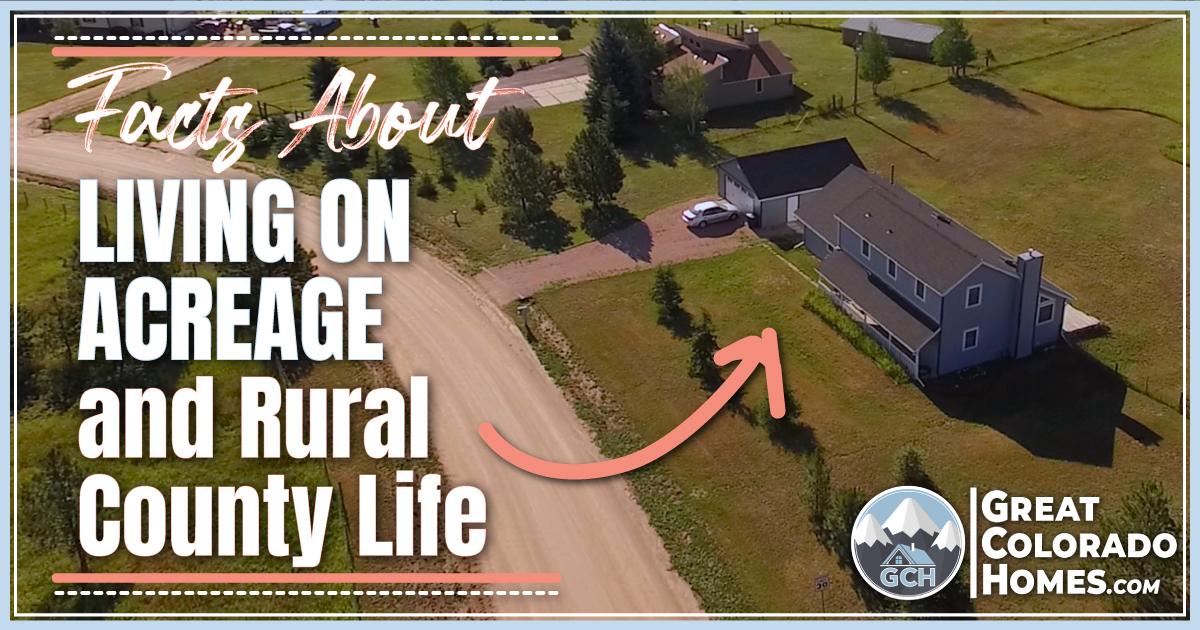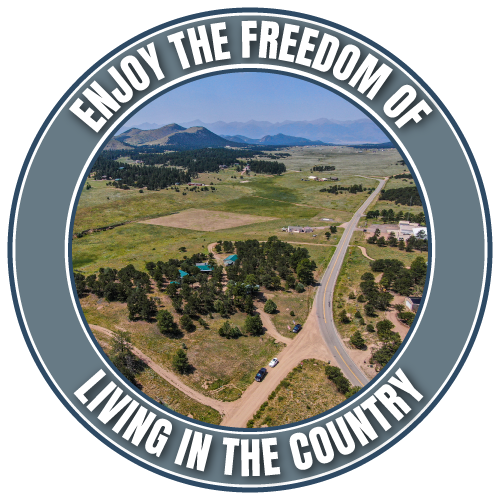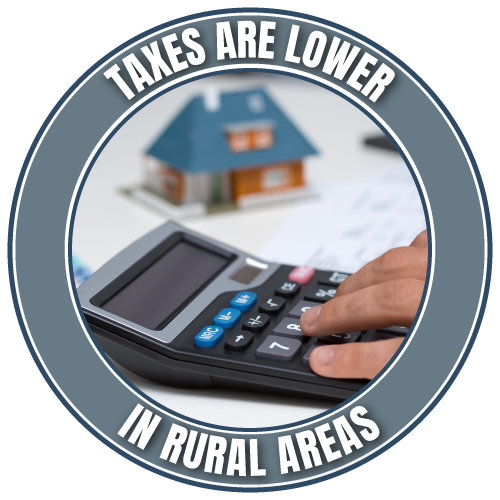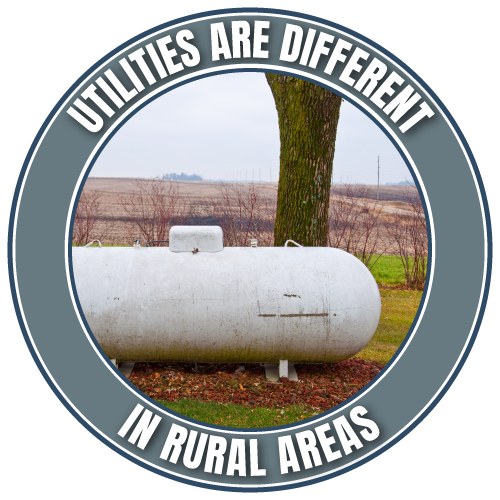14 Facts About Living on Land & Acreage | Rural Country Life

Rural country life and living on acreage have many benefits and challenges. As a child, I grew up in the country on a small horse ranch in Texas. This experience gave me an understanding of the many benefits of country living.
When I first moved to Colorado in 2000, I worked on a 1000+ acre ranch in the Rocky Mountains. It was a fantastic experience that I will never forget. I have also owned and lived on acreage properties over the last 15 years. During this time, I have discovered many benefits to owning, maintaining, and living on rural land.
Let’s take a deeper look at some of the pros and cons of rural county living.
The Main Benefits of Living on Rural Land:
1. Enjoy the Freedom of Living in the Country
 Freedom is the #1 benefit of country living. It’s what most people want. Living on acreage may be just what you need if you enjoy doing what you want without the restrictions of city regulations and neighborhood HOAs (homeowners associations).
Freedom is the #1 benefit of country living. It’s what most people want. Living on acreage may be just what you need if you enjoy doing what you want without the restrictions of city regulations and neighborhood HOAs (homeowners associations).
In a neighborhood, you may need help finding places for your friends and family to park when they come for the holidays. On land, that is usually never a problem. There is plenty of parking area throughout the yard. Also, people can hang out outside, leaving more space for everyone inside the house.
People complain about noisy neighbors, cluttered front yards, and unkept landscaping in neighborhoods. In the country, there is no one around to complain. Your freedom is much more noticeable when living away from people.
2. Flexibility of Living on Acreage
Many people want to buy a camper or a trailer to pursue camping or hobbies. This allows them to escape and relax or pursue adventures in the mountains.
You can park your RVs, campers, and trailers at home if you live on land. Having space to be flexible with your land can make room for a shed for storage, a shop for working, an extra garage, a chicken coop, a barn for animals, a greenhouse for growing, a motocross track, a horse arena, and more.
Most neighborhoods don’t allow parking; storage fees typically cost over $150 a month. Consider this when comparing regular neighborhoods with country living. Flexibility is valuable.
3. Peace and Quiet of Living on Rural Property
Most lots in newer neighborhoods are getting smaller and smaller. Suppose living in a fishbowl sounds like a nightmare to you; then living on land would be a great benefit that you would reap every day. The peace and quiet encourage stress levels to drop and help people relax.
Porch pirates and solicitors spend little time in the country. I never have to worry about my packages being stolen or solicitors knocking at my door. My dogs love the freedom to roam around our yard. I rarely ever have to take them for walks.
Until you have experienced a few nights of sleep in the peace and quiet of the country, it’s hard to understand how much of an impact it can have on your stress levels and mental state.
4. Enjoy More Open Spaces in the Country
 When living on acreage, you will have room to ride your ATV, set up an archery range, have a large garden, or let your family be more of the “free range” variety. When kids have the space and freedom to play outside, it benefits the whole family. Their creativity is expanded by their freedom to roam.
When living on acreage, you will have room to ride your ATV, set up an archery range, have a large garden, or let your family be more of the “free range” variety. When kids have the space and freedom to play outside, it benefits the whole family. Their creativity is expanded by their freedom to roam.
Living on land encourages less screen time and more fresh air. This is an excellent benefit that I have learned to appreciate more every year. My kids would rather be outside playing than staring at a screen.
The atmosphere of the open country lowers stress levels and connects us more to nature. In city neighborhoods, it is often hard to see the stars at night; however, with less light pollution, the stars are vibrant in the country. The lack of city sounds also helps to create a less busy environment to relax.
5. Making Money off of Rural Land Ownership
There are creative ways to make extra money by using your land. This is a less commonly known fact about owning acreage.
You can rent out storage for campers and trailers. Storage fees for these items are getting more expensive every year. Use a portion of your land as a lot for customers to park their expensive toys.
You can build a workshop to start a small business you have always dreamed of. Most people would have to rent another building away from home to do this. When you own acreage, you can build that shop near your home and never have to pay commercial rent or leave your property to work.
6. Taxes are Lower in Rural Areas
 Did you know taxes are lower in the country than in the city? When neighborhoods are built, the community will take out loans to build roads, utilities, and infrastructure. The municipality returns that money by taxing the new areas with a higher tax rate.
Did you know taxes are lower in the country than in the city? When neighborhoods are built, the community will take out loans to build roads, utilities, and infrastructure. The municipality returns that money by taxing the new areas with a higher tax rate.
If you don't live within the city limits, you will pay fewer taxes than those that do. If you buy a car in Colorado, your tax rate is based on your home address. If you live on land outside the city limits, you will pay 2-3% less on purchases like automobiles or trailers.
You can look up the sales tax rate for any given address in Colorado here: https://colorado.ttr.services. Use this resource to determine how much money you can save on taxes by living in the county.
7. You Can Grow Your Own Food on Acreage
Processed foods are getting out of control. More people are interested in growing their food than in previous years. When you live on land, this is very easy to do.
We have successfully learned how to grow a healthy produce crop in Colorado’s dry environment. Every area of the country is different and requires a different strategy. The best addition we made was adding a small greenhouse to our property.
Our crops have been abundant inside of the protected greenhouse environment. With a bit of research and preparation, you can grow hearty organic veggies and control the food source that your family eats.
Having the option to grow your own food feels fantastic.
The Main Challenges of Living on Rural Land:
8. Maintaining Your Acreage Takes Time and Effort
 If you live on land, you will inevitably have maintenance to perform on your property. It will vary based on what physical elements you have on your grounds. Fences will need mending, grass and weeds will need attention, snow will need to be addressed in the winter, and driveways often need maintenance.
If you live on land, you will inevitably have maintenance to perform on your property. It will vary based on what physical elements you have on your grounds. Fences will need mending, grass and weeds will need attention, snow will need to be addressed in the winter, and driveways often need maintenance.
Having a tractor or skid steer is highly beneficial to helping you stay ahead of what’s to come. I enjoy the tasks required to maintain my land, but others may find it daunting.
9. It Takes Longer to Dive to Amenities When Living in the Country
The further out you live, the more privacy and the less expensive the initial cost of the land. It also means driving further to work, schools, healthcare, stores, and restaurants. The extra drive time can start to add up. This is the number one reason most people live in the city.
10. Internet Services are Scarce or Non-Existent
Most rural properties will not have fiber internet. Although this is changing, it is more likely that you will have average internet service, if any at all. The further out you go, the more likely you are to suffer with old-school slow internet.
If you put high value in blazing-fast internet for gaming and streaming, check into what services and speeds are available in that area. Acreage close to neighborhoods and city limits tends to have better internet speeds.
Companies are steadily building new lines of fiber for future internet usage. However, the process is slow, and it may still take many years to get high-speed internet to that rural property you’re considering buying.
11. Utilities are Different in Rural Areas
 When living on land, you will likely pay for electricity, but water, gas, and sewer are served through a well, a large propane tank, and a septic system. You won’t have a monthly utility bill for some of those services.
When living on land, you will likely pay for electricity, but water, gas, and sewer are served through a well, a large propane tank, and a septic system. You won’t have a monthly utility bill for some of those services.
The bad news is that when and if any of these systems fail, you are responsible for the cost of repairs. You must inspect these items to ensure you aren’t inheriting a failing system.
Before any home is sold in El Paso County, the El Paso County Public Health (EPCHP) requires the buyer or seller to provide an inspection of the wastewater treatment system or septic tank. This inspection includes a county acceptance document of the inspection that the title company needs before selling the property and transferring the title to the new owner.
This process sounds complicated, but your Realtor will handle most of this with you.
12. Water Rights on Land in Colorado
Water scarcity is a massive issue in Colorado. Depending on the age of your well, your water rights will vary. Each well water permit will describe the allowable uses for your water.
Many properties on several acres only have a household well instead of the more flexible domestic well. Household wells only have the right to use the water inside the home. They cannot garden, feed livestock, or use sprinklers with this well permit.
Older homes tend to have more well water rights, as the county was more generous with well permits decades ago. In 1972, the county became more strict and issued fewer domestic well permits.
It is crucial to use a realtor who understands the ins and outs of well permits and water rights when looking for a rural property. Feel free to contact me if you have any questions on this issue.
13. Country Living Can Be Messy
 If you have a dirt driveway or walkways, you will experience mud in the winter/spring and dust in the drier months. This can be remedied by adding concrete, asphalt, stones, or small rocks to frequently traveled areas.
If you have a dirt driveway or walkways, you will experience mud in the winter/spring and dust in the drier months. This can be remedied by adding concrete, asphalt, stones, or small rocks to frequently traveled areas.
Your car will be dirty often and need washing more than those living in traditional neighborhoods where all roads are paved. When you see a car in the city covered in dust, they likely live on a dirt road somewhere. This dust can get into the electrical systems of some vehicles and cause problems.
There are two distinct mud seasons in the late Fall and Spring if you live in the mountains. There are always a few weeks when snow constantly melts and creates a lot of mud. This can be a hassle when kids come in and out of the house all day. Use heavy-duty floor mats and train the kids to wipe their feet well when entering the house.
14. Financing Acreage Can Be Difficult
Most home loan mortgages are for homes in neighborhoods in the city. Homes on land in the county can present a challenge for financing. Some mortgage lenders won't work with these types of loans. I recommend using a mortgage broker who specializes in rural land loans.
USDA loans have been created to make buying homes in rural areas easier for qualified buyers. They can reduce the amount of downpayment you may need. Be sure to ask your mortgage lender about your options.
Final Thoughts on Living in the Country
These are some of the main benefits and challenges of living on an acreage that I have experienced over the years. This article will help you as you pursue your dream of living in the country.
Consider each point above and the differences you may experience when living on acreage. In my opinion, the pros outweigh the cons of living on land. The benefits are well worth the extra effort I must make to maintain my freedom away from the city.
If you have any questions about living on land in Colorado, I would be happy to help and guide you along the way. My family and I love living on land, and I enjoy assisting others to find the perfect place for their family.

Hi! I'm John Korpita, a local Realtor in Colorado Springs. I enjoy writing about my extensive experience with Colorado and real estate. If you have any suggestions or if I can help you in any way, please contact me here to let me know. Thank you for reading my article! 🙂
Our Most Recent Blog Posts:

Here's a step-by-step guide to take you through the home-selling process.

What happens after you go "under contract" on a home?

Where are the best areas to invest in Colorado Springs?

Here are the 10 most important things to do before listing.

The complete step-by-step guide to buying a home.

Here are the most common fees to expect when buying a home.